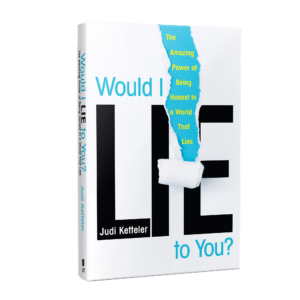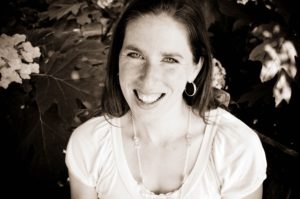Judi Ketteler had a bit of an honesty crisis a few years ago. While she considered herself an honest person, she also suspected that she was paying little mind to the everyday decisions about honesty—and wondered what might be different if she paid attention. So she started an honesty journal, where she wrote down every decision regarding honesty. That experiment turned into an essay for The New York Times, which turned into the book Would I Lie to You? The Amazing Power of Being Honest in a World That Lies. She recently spoke with WellWell about the consequences of everyday lying and why telling the truth is important.
Why is it difficult to tell the truth?
First, we need to understand the reasons we lie, which we can group into two large buckets: self-interested reasons and prosocial reasons. A lie of self-interest is one you tell to benefit yourself, whether it’s a benefit to your wallet (like fudging on your taxes) or your ego (like exaggerating or rounding your weight down or your income up). Telling the truth can be difficult when it goes against your self-interest.
What about prosocial reasons? 
It gets more complicated when you factor in what researchers call prosocial lies, which are the lies you tell for the benefit of someone else—like offering encouragement instead of telling a friend the brutal truth. Then there is telling your aunt you loved the gift she gave you, when in fact, you promptly donated it to Goodwill. With these kinds of lies, you are weighing competing interests, like kindness versus truth.
What repercussions come from not telling the truth?
Many repercussions are obvious, like you may get fired, lose the trust of someone you love or face legal consequences. Those repercussions matter but what often goes most underappreciated are the emotional repercussions that come from not noticing our behavior and patterns of lying.
What are lying’s emotional repercussions?
Constantly centering on everyone else’s lies, while not engaging with our own, can lead to a feeling of cognitive dissonance. You are trying to hold two opposing ideas in your brain, as in, “I don’t lie because lying is bad,” vs. “I know I lie a lot, but it’s justified.” I wrote Would I Lie To You because that cognitive dissonance was catching up with me. I was starting to feel powerless in a world of lies and angry that the world felt so dishonest. At the same time, I was beginning to suspect that I was part of the problem, in that I wasn’t always being as honest as I could be. Where I saw this most was in my marriage and some of my friendships and definitely in my relationship with my kids.
Why is it difficult?
It’s hard to forge deep relationships with people, be both vulnerable and forgiving, or raise children in the era of Siri (who can answer any question they have) if you don’t engage with your decisions around honesty.
How did your commitment to honesty affect your personal life?
Focusing on honesty really helped my marriage, helped my husband and I overcome a rough patch. It also helped me feel more engaged with my kids, who are now 11 and 9. It’s not that I was a disengaged parent before. But I wasn’t paying nearly enough attention to how I answered their questions. My focus on honesty rubbed off on them, too.
How so?
We had so many conversations around honesty that we would never have had otherwise. Kids are dealing with so many scenarios related to honesty. Yes, it’s the typical stuff that we all dealt with (who said what on the playground, not cheating on tests, etc.). But it’s also the stuff that adults are struggling with too—like how you represent your life on social media and how you regard what other people are putting up on social media. Kids need to be around adults who are grappling with these issues too and can talk to them about these things in a real way.
How was honestly impacted your confidence and mentality?
Overall, I feel more empowered to say what I think in so many situations—and at the same time, I feel empowered when I consciously don’t say what I think, because I am paying attention to the reason why. I’m not living life on autopilot.
 About Judi Ketteler
About Judi Ketteler
Judi Ketteler has been writing stories since she was old enough to hold a pencil. An award-winning essayist, she has contributed to dozens of publications, including The New York Times, The Washington Post, Los Angeles Magazine, Better Homes & Gardens, and Runner’s World. She is also the author of two books about sewing. She lives in Cincinnati with her husband and two children.
Learn more at judiketteler.com.












